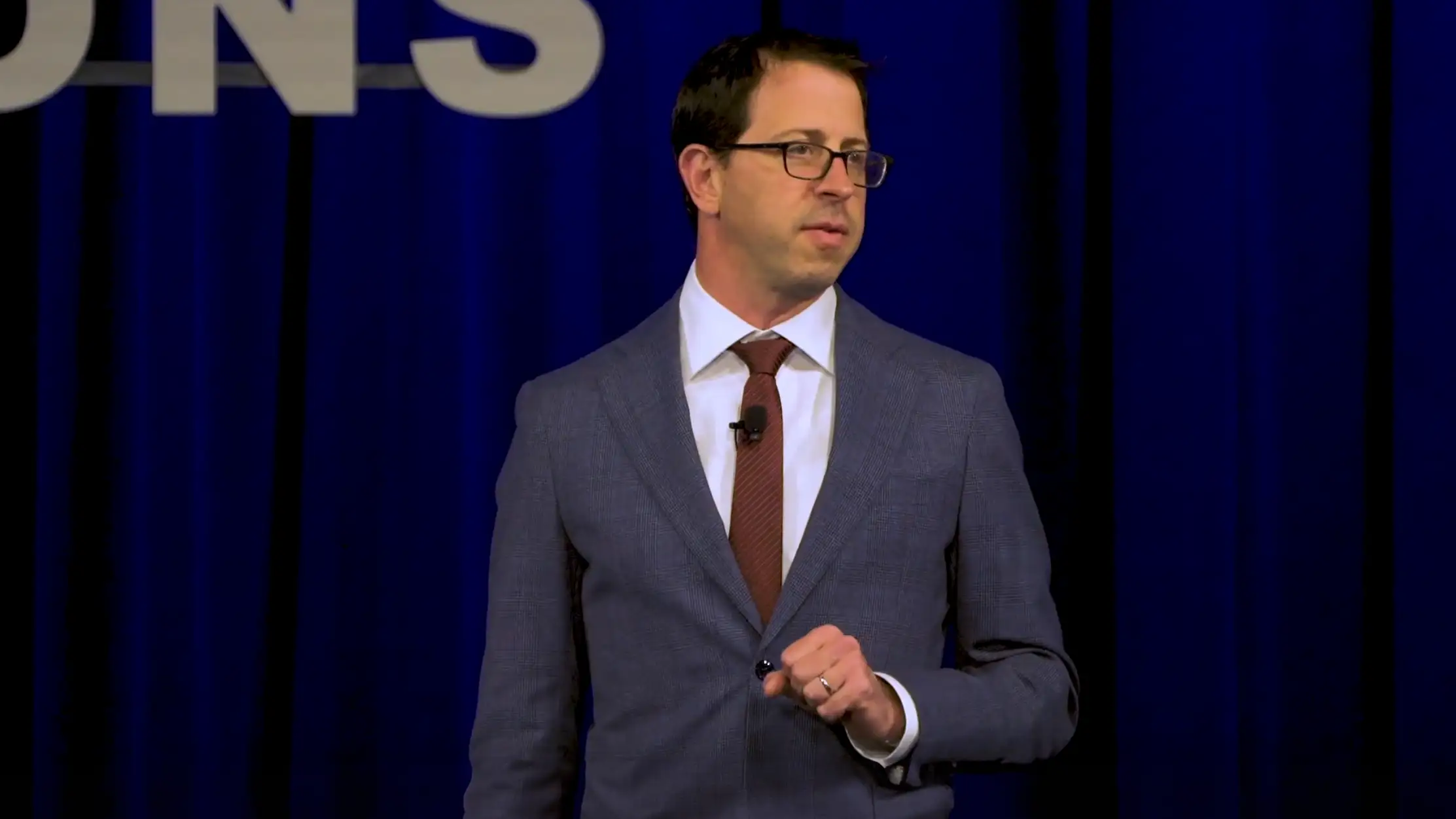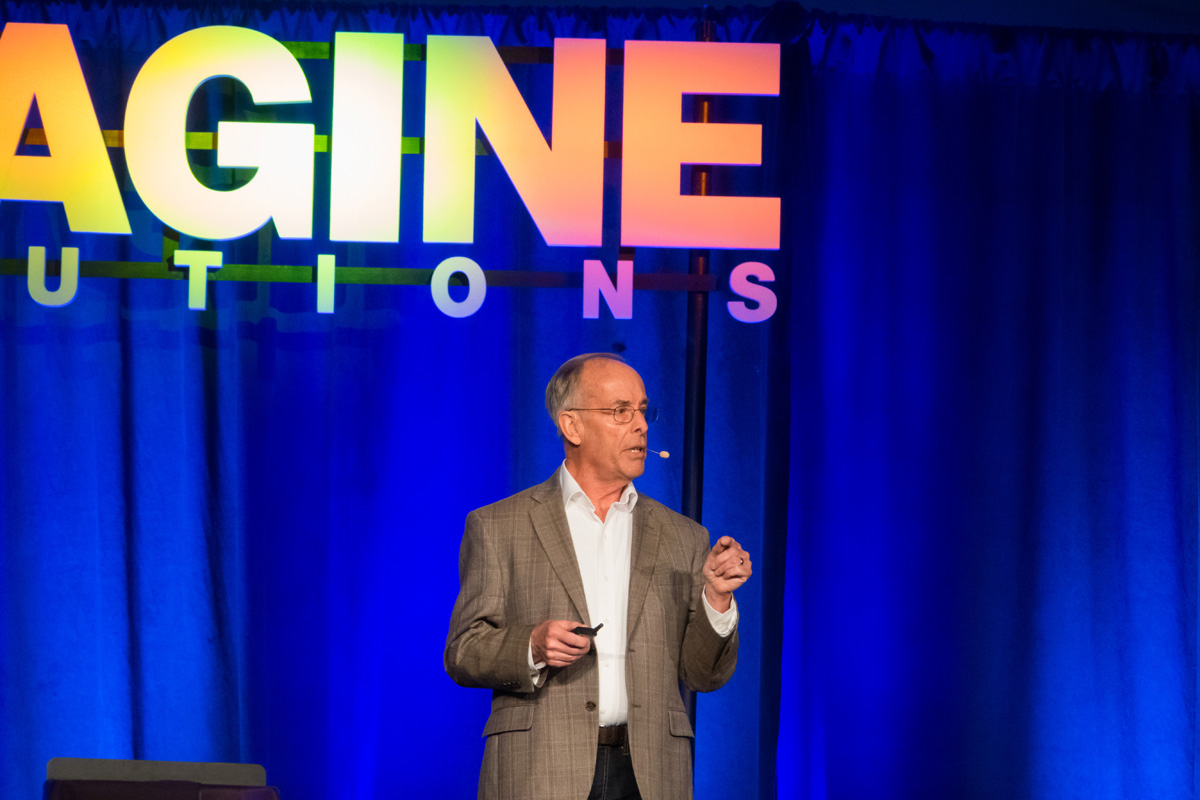Measuring the Wellbeing of the World
Economist Michael Green is CEO of the Social Progress Imperative, an organization comprised of philanthrocapitalists, social entrepreneurs and policymakers. He speakes of the group’s vision: a world in which social progress sits alongside economic prosperity as a measure of development. Green also explains the Social Progress Index, considered to be among the most comprehensive international measures of wellbring, developed by the organization to help quantify social progress separate from economic indicators, and to rank societies based on how they meet the needs of citizens. He delves into those qualities that define basic human needs, the foundations of wellbeing, and the availability of opportunity.
00.00
our first session let's get going is entitled open your mind in this session you will meet and hear from two extraordinary game changers and part one of our great influencers series will be on Wall Street that is set section 1 so open your mind as to how we now across the world might address it different a more robust strategy for economic development imagine that a person and a group could provide the framework for thinking acting and measuring such a breakthrough let's start by bringing to the stage an individual has created a concept called the social Progress Index that he says will make us think and measure economic development differently please welcome to the stage Michael Green Michael it's a great pleasure to be here with you today and I have to say that a naples florida in this event is going to live in my memory forever because yesterday my wife and i celebrated our first wedding anniversary and we got to celebrate her here so if you see my wife's ashes she's around
01.01
somewhere and she's also got our song Peter with her so that's the baby is our son Peter so do say hello he's very friendly and he loves to meet people on the source of January 1934 a young man presented a report to the United States Congress that more than 80 years on still shapes the lives of everyone in this room today still shapes the lives of everyone on this planet that young man wasn't a politician he wasn't a businessman he wasn't a civil rights activist or a face leader he was that most unlikely of heroes an economist his name was Simon Kuznets and the report that he presented was titled national income nineteen twenty nine to nineteen thirty-two now you might look at this
02.02
and think that this report is rather boring well I've read it and it is very boring but this report is the foundation of how today we measure the success of our societies the system of national income accounting that we know best as gross domestic product or GDP GDP has defined and shaped our world for the last 80 years and today I want to talk about a different way to measure the success of our societies to define and shape our world for the next 80 years but first we have to understand why cousin its innovation was so successful it came of course with a critical moment as the US economy was plummeting into the Great Depression and policymakers simply didn't know what was going on they lacked good quality statistics about how the economy was performing and without good statistics they couldn't
03.00
figure out the right policies what caused this report gave them was those reliable numbers about how the US economy was performing what it was producing was allowed them eventually to come up with the solutions that pulled the US economy out of the slump because this innovation had proved its usefulness and that's why it's spread around the world and today every country produces GDP statistics on a quarterly basis you think that cuz nets would have been proud of it but he wasn't because in that first report in the introduction on page seven he issued a warning he wrote he wrote the welfare of a nation can therefore scarcely be inferred from a measurement of national income as defined above now it's not the greatest sound bite he was an economist remember but the message is clear GDP national
04.02
income accounting is a tool to help us manage the economy he tells us it's not a way to measure the performance of our societies but we have ignored his warning trillions of dollars of capital move across borders based on whether GDP is going up or going down our politicians campaign on whether they've produced more economic growth or whether their opponent is produced not enough we live in a world dominated by GDP but we know the GDP is flawed GDP counts bombs and prisons as progress GDP is blind to the environment GDP has nothing to say about fairness or justice and GDP is death to issues of friendship or community is it any surprise for the world marching to
05.00
the drumbeat of GDP is at risk of environmental destruction and seething with such anger I believe that we are ready for a measurement revolution a different way to measure the success of our societies we're ready because the financial crisis of 2008 showed us that as current ways of measuring success were just showing phantom mirage progress we're ready because the Arab Spring of 2010 showed us that countries that were so supposed to be economic superstars like Tunisia will in fact societies crumbling from within we're ready because we see the way that our traditional heuristics of economic policy of failing and that people are feeling left behind and angry and we're ready because we can measure and define statistics in ways it would have been unimaginable in christmas day today i'd
06.01
like to introduce to you the social Progress Index it's a whole new way of looking at our societies it's a measure not based on economic Sprott economic proxies but the real things that matter to real people the social Progress Index asks three basic questions about a society first does everyone have the basic needs of survival food water shelter safety secondly does everyone have the building blocks of a better life education information health and a good quality environment and finally can everyone in our society pursue their hopes and dreams without impediments with rights freedom of choice freedom from discrimination and access to the world's most advanced knowledge together these 12 components make up the social Progress Index and for each of these components we find
07.01
indicators to measure not effort but achievement we don't measure how much a country spends on health care we measure the lengths and quality of people's lives we don't measure where the laws are passed against discrimination we measure whether people experience discrimination so let me show you what we found from our 2016 index results and i'm going to show you on this chart so here we've got social progress on the vertical axis higher is better and then just for fun just for comparison on the horizontal axis is GDP per capita further to the right more GDP and the country in the world with the highest social progress in 2016 was Finland and the country in the world was the lowest social progress was sadly Central African Republic so you're smart people
08.00
of what you'll have spotted is that of course finland has a much higher GDP per capita than Central African Republic it's a good point well made but look at these two countries here's Malawi Malawi has a very similar gdp to Central African Republic with a much higher level of social progress and here's the United States it's got a significantly higher GDP and Finland with a lower level of social progress so what's going on well let me show you a few more countries first the highest performing g7 country is actually Canada my country the United Kingdom does pretty well its second amongst the g7 but much more importantly we beat the French he British um of the emerging economies the bricks actually Brazil came out top of the bricks then South Africa then Russia then China and then India so
09.04
those are some of the major countries in the world what I'll do now is put in dots representing all the countries who've been able to measure 133 countries so far and then through this data I'm just going to put in the regression line to show the average relationship between GDP and social progress here it comes now what this shows us i think is three things first of all GDP is not terrible on the whole you get more GDP you get more social progress in general terms especially if you're a poorer country see how sharp the curve is for poorer countries and that kind of makes sense if you want to develop as a country you've got to get some resources to invest in roads and nurses and teachers etc that matters economic development can be a big driver of social progress but what we also see is the way that this curve flattens out but as you get richer it gets hard as a squeeze social programs out of your GDP
10.00
it's harder sometimes because of course as you get richer you get new problems related to your wealth those could be environmental problems or it could be problems like obesity the other critical thing to notice about this data is the way that there's plenty of noise around this trendline and what this shows us in simple terms is that GDP is not destiny if you are developing York if you're planning your country's development solely based on getting more than more GDP you only have half a plan at every level of GDP there are opportunities for more social progress and risks of less there are countries like Kuwait the highest GDP country in our sample that really is not turning its wealth into social progress very efficiently all there are countries like Costa Rica you'll see just above Brazil here's a country with a pretty modest wealth but achieving a level of social progress
11.01
similar to that of Western European countries it's a really efficient of turning its wealth into social progress for its citizens and in a way what we need is more countries to be following this type of approach understanding how to get social progress real wellbeing for its citizens from its wealth now let's take a bit of a deeper dive into what the social Progress Index says about the United States and what I'm going to do with this is I'm going to look at the United States compared to other countries of similar GDP this is a bit like in boxing we're going to compare a heavyweight with other heavyweights not with a flyweight or a lightweight so what we're going to do is just take a method where we take 15 countries the 15 countries closest to the u.s. in terms of GDP for those countries we take the median score for each of the indicators and then we see whether the u.s. is performing significantly better or significantly worse than that peer group okay and now
12.01
i'm going to put it all together on this scorecard now there's a lot of data here and i'll walk you through it but your first impression is that you will see a lot of red red is not good but let me show you what it means if you look at the top left hand corner of this the scorecard you'll see that the u.s. is actually ate in the world asset on GDP per capita from our sample with only 19th on social progress so the US social progress call is significantly lower than it should be for a country of this wealth and that is a distinction that oh the u.s. is the only major industrial economy that shows that performance it's a really really striking finding the u.s. is not delivering social progress out of its gdp in aggregate terms but what we can then do is break this down and look at the 12 components and see where the weakness lies I think as we look at it you're not going to be
13.00
surprised personal safety is an area of weakness not just homicide rate would also road traffic accidents the school system problems in the school system access to basic knowledge health and wellness the u.s. is only 69 in the world on health and wellness despite spending more per capita than any other country in the world the environment is at risk even personal rights are not as good as other peer countries it's a very very striking pattern of underperformance now when I present this I often get attacks from both sides some people say well the a social progress it's a classic liberal conspiracy this is anti-business on the point i always make to them as well the chairman of our advisory board is Professor Michael Porter from Harvard Business School the world's most cited writer on economics and business the Guru on competitiveness so if he is an anti-business liberal I'd be very surprised and sometimes we also get
14.01
attacked by say well this seems very negative are you attacking particular political parties or particular administrations and let's see no because what this data shows us is not the policy of one administration or the other it's showing a pattern of decades of the failure to find solutions in to invest adequately or effectively in the real things that matter to real to ordinary American citizens this is a real date of real data that shows the size of the problems United States faces now one of the challenges in measuring the United States of course is but it's a big place and it's highly varied but that's not necessarily a problem because one of the strengths for the social Progress Index is we don't have to just measure countries we can actually measure measure any community we like we've in fact we've already developed a social Progress Index for the European Union for different regions of the European Union and this is now being used by the European Union to plan their
15.00
cohesion policy for the 28 countries we've also measured cities this is an that social progress map of Bogota in Colombia we've got a whole number of cities in Latin America now using the social Progress Index to plan their development strategies we can also do rural areas we've done a social Progress Index for 772 municipalities in the Amazon region of Brazil that's the pretty remote but we can still measure those communities and indeed in one municipality place called corollary which is right up in the Amazon two days to get there by boat we've either been able to go in and measure specific communities within that municipality the social Progress Index is a flexible flexible tool that can be applied to any team country-region state city district community and that's why we're the next project we're working on is now social Progress Index for the United States and this is called the imagine solutions conference so imagine
16.01
if we could get a detailed social progress map from the states of the u.s. or maybe for the counties or maybe for even more granular areas if we can get this data what could we do with it there's the old saying of course that we manage what we measure and we believe that if we can measure the progress of our societies rigorously in terms of the real things that matters are real people we can build new collaborations new efforts that can more effectively deliver improvements there will lead to real improvements in people's lives please join us thank you [Applause] [Music] you










